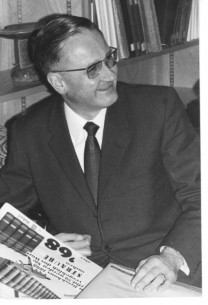Helmut Straube (* May 6th, 1923 Neiße, Upper Silesia; + March 22nd, 1984 Munich)
S. was a marked German scholar of African and Ethiopian Studies. He went to school in Dresden, Berlin, Göttingen and finally complied his Abitur 1940 in München. During Word War II. he was severely wounded. After some months as prisoner of war he went to Wiesbaden and soon became a student at the University of Frankfurt/Main, he attended classes in different fields and departments before he enrolled in anthropology, geography and history. In 1952 he obtained his PhD in Ethnologie with a thesis on African Religion under the supervision of Adolf Ellegaard Jensen. In 1967 he habilitated at the University of Köln with a study on Nilotic people. In 1968 he obtained the chair of the institute of Ethnology and African Studies at the University of Munich, which he directed until his death. 1976 he was elected as member of the Bavarian Academy of Sciences.
He carried out field work in Southwest-Ethiopia in 1954 –1956 and in 1973-1974 among Omotic and Kushitic speaking people. In a comparative way he analysedcontrasting organizational patterns of the centralized sacred kingdoms and acephalous societies.
His analysis of divine kingdoms, and his researches on awarding leading offices by „feasts of merit“ are pioneer studies.
S. felt himself akin to a „Culture History“ approach, but was also aware of its deficits. Hence, it was his aim to achieve a more reliable basis for historical anthropology. He saw possibilities in a broader interdisciplinary approaches integrating findings from the fields ethnography, archaeology, history, linguistics and geography. His synoptic-holistic advance is, for example, visible in his works on the „agriculturale intensification-complex“. Long before ecology was „discovered“ in the West, S. indicated that this agrarian method, developed in Africa, is ecologically more appropriate than many modern techniques praised as progressive.
S. was one of the last representatives of German Kulturhistorie (Culture History) which in his lifetime had been pushed to the academic fringes already. But it is his lasting merit that through the development of interdisciplinary comparative methods he was able to present a number of plausible theories on East African history, thus giving inspiration for further studies.
(This short portrait was written by Hermann Amborn, August 2011; Photograph by courtesy of S. Seyfarth)


